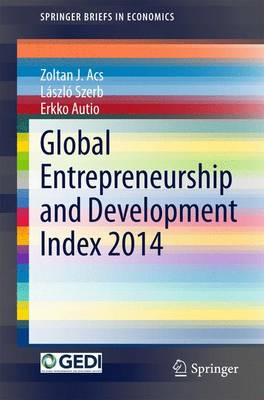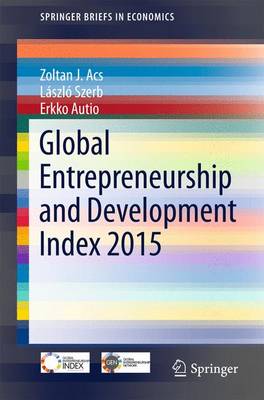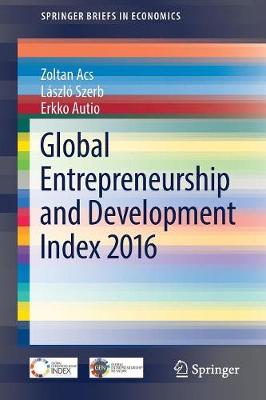SpringerBriefs in Economics
5 total works
Global Entrepreneurship and Development Index 2018
by Zoltan J. Acs, Laszlo Szerb, Esteban Lafuente, and Ainsley Lloyd
This brief presents a detailed look at the entrepreneurial ecosystem of nations around the world by combining individual data with institutional components. Presenting data from the 2018 Global Entrepreneurship and Development Index (GEDI), which measures the quality and scale of entrepreneurial process from 137 countries world-wide, this book provides a rich understanding of entrepreneurship and a more precise means to measure it. The novelty of the GEDI 2018 edition is the examination of the connection between the GEDI score and the computed total factor productivity (TFP) values.
The Global Entrepreneurship and Development Index is an annual index (composite indicator) that measures the health of the entrepreneurship ecosystems in a given country. The authors have identified 14 components (or pillars) that are important for the health of entrepreneurial ecosystems, identified data to capture each , and used this data to calculate three levels of scores for a given country: the overall GEDI score, scores for Individuals and Institutions, and pillar level scores (which measure the quality of each of the 14 components).
Global Entrepreneurship and Development Index 2014
by Zoltan J. Acs, Laszlo Szerb, and Erkko Autio
This volume captures the context features of entrepreneurship and fills a gap in the measurement of development. Building on recent advances in entrepreneurship and economic development, the authors have created an index that offers a measure of the quality of the business formation process in 120 of the most important countries in the world. The authors expertly capture the contextual feature of entrepreneurship by focusing on entrepreneurial attitudes, entrepreneurial abilities and entrepreneurial aspirations. The data and their contribution to the business formation process are supported by three decades of research into entrepreneurship across a host of countries.
The Global Entrepreneurship and Development Index is a construction of individual and institutional measures that integrates 31 variables from various data sources into 15 pillars, three sub-indexes and a 'super index'. The relationship between entrepreneurship and economic development appears to be more or less mildly S-shaped. The findings suggest moving away from simple measures of entrepreneurship across countries illustrating a U-shaped or L-shaped relationship to more complex measures, which are positively related to development. The model has important implications for development policy.
This unique book will be invaluable for researchers, policymakers and entrepreneurs keen to expand their understanding of entrepreneurship and development.
Global Entrepreneurship and Development Index 2015
by Zoltan J. Acs, Laszlo Szerb, and Erkko Autio
This volume provides a detailed look at the entrepreneurial ecosystem of different nations by combining individual data with institutional components. The composite index presented in this book, the Global Entrepreneurship Index (GEI), aims to measure the quality and scale of the entrepreneurial process in 130 countries around the world. The authors have developed a system that links institutions and agents through a National Entrepreneurial System (ecosystem) in which each biotic and abiotic component is reinforced by the other at a country level. The enclosed data, from both individual- and country-level institutions, provides policymakers a tool for understanding the entrepreneurial strengths and weaknesses of their respective economies, thereby enabling the implementation of policies that foster productive entrepreneurship.
Distinct from both output-based entrepreneurship indexes (i.e., new firm counts) and process-based indexes (i.e., comparisons of policies and regulations), the GEI is designed to profile national systems of entrepreneurship. The GEI is a construction of individual and institutional measures that integrates 31 variables from various data sources into 14 pillars, three sub-indexes and a ‘super index’. The relationship between entrepreneurship and economic development appears to be more or less mildly S-shaped. The findings suggest moving away from simple measures of entrepreneurship across countries illustrating a U-shaped or L-shaped relationship to more complex measures, which are positively related to development. The Index also does not focus exclusively on high-growth entrepreneurship; it also considers the characteristics of entrepreneurship that enhance productivity: innovation, market expansion, being growth oriented, and having an international outlook. Moreover, because entrepreneurship can have both economic and social consequences for the individual, the GEI captures the dynamic, institutionally embedded interactions between the individual-level attitudes, abilities, and aspirations that drive productive entrepreneurship.
This
unique book will be invaluable for researchers, policymakers and entrepreneurs
keen to expand their understanding of entrepreneurship and development.
Global Entrepreneurship and Development Index 2016
by Zoltan Acs, Laszlo Szerb, and Erkko Autio
This brief captures the contextual features of entrepreneurship by measuring entrepreneurial attitudes, abilities, and aspirations at both the individual- and country-level. Featuring data from the 2016 Global Entrepreneurship and Development Index (GEDI), which measures the quality and scale of the entrepreneurial process in 133 countries around the world, this book provides a tool to help policymakers and governments harness the power of entrepreneurship to address some of the economic challenges faced at the country level. In addition to the yearly data and comparisons, this edition also explores the relationship between entrepreneurship and other measures of development.
Distinct from both output-based entrepreneurship indexes (i.e., new firm counts) and process-based indexes (i.e., comparisons of policies and regulations, the GEDI is designed to profile national systems of entrepreneurship. The Index does not simply count new firm registrations nor is it an exercise ofpolicy benchmarking. It also does not focus exclusively on high-growth entrepreneurship; it considers the characteristics of entrepreneurship that enhance productivity, such as innovation, market expansion, globalization, and growth potential. Finally, recognizing that entrepreneurship has a different impact in different economic and institutional contexts, the GEDI combines individual-level data with data that describes national institutions, as well as economic and demographic structures, to provide an institutionally embedded view of the drivers of productive entrepreneurship.




